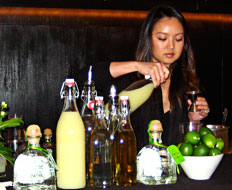Move over, rice and salsa; Chipotle will soon have agave nectar, lemon-lime juice, and Patron Silver tequila on its assembly line. The brand plans to bring premium margaritas to all locations with a liquor license—about 900 of them—beginning April 29.
QSR got a sneak peak at the new margaritas last week during Chipotle’s launch party at its New York City test kitchen, where servers mixed margaritas for two hours as the restaurant’s chefs whipped up fancy finger food.
While margaritas have always been on Chipotle’s menu, director of communications Chris Arnold says, they were a well-kept secret. The original margarita was made from a mix and used lower-end Sauza tequila.
“That wasn’t really in line with how we treat the rest of our food,” Arnold says. “We wanted to take the time to apply some sort of discipline to the margaritas. The ultimate goal of it wasn’t because we can triple alcohol sales so much as, ‘We can do this better than we are, so let’s do it.’”
The Patron margaritas will be made to order for customers using tequila, triple sec, a blend of lemon and lime juices, and organic agave nectar. A handmade version of the Sauza margarita will also remain on the menu at a lower price point. The launch is seasonally timed for the new margaritas to be available for Cinco de Mayo, May 5.
The Patron margarita’s price will range from $6.50 to $8, depending on the market, which experts say will place it on the higher end of the industry’s beverage spectrum. But working in Chipotle’s favor will be the strength of the Patron brand, whose popular tequila is already used in margaritas and mixed drinks at full-service restaurants and bars.
“Bringing in a brand like Patron gives them a really strong, well-known partner, a super premium positioning,” says Donna Hood Crecca, senior director of the adult beverage resource group at Technomic. “That will absolutely get people interested in the margarita program that they have, and paying a little bit more attention to it.”
The encroachment into full-service territory comes with its challenges, however.
“They’re doing a premium cocktail, made to order,” Crecca says. “What’s the service time on that? Will it slow their service time? With fast casual, you have the word fast in there—people want to keep things moving.”
Other operational challenges include the consistency of the drink recipe and ensuring employees are able to do a measured tequila pour quickly. Overcoming those challenges will ensure Chipotle keeps its core costs in line, Crecca says, and keep the drinks within the standard the brand establishes.
Technomic anticipates a 7.5 percent growth in adult beverage in fast casual, and Crecca says she sees more alignment for the industry with beer, which is easier to bring to fast casual than mixed drinks. She adds that the Patron margaritas give Chipotle a strong point of competitive differentiation.
Chipotle’s culinary director, Nate Appleman, says the Patron tag fits the brand better and could pique the interest of consumers who may have failed to notice the old margaritas on the menu.
“If you go to a Chipotle, it’s a little more upscale,” he says. “We offer a little more than some other restaurants. And a Patron margarita is a higher-quality margarita than what we were serving.”
Alcohol sales make up about 1–2 percent of Chipotle’s overall sales, Arnold says. The brand also offers select beers.
Last week’s launch party gave Chipotle executives an opportunity to show off the test kitchen, located just north of Manhattan’s Greenwich Village. The gathering room in front opens onto a large, fully equipped kitchen in back, where Chipotle’s culinary team spent the evening preparing a bevy of finger foods. Concoctions included crab mixed with corn, ramps, and adobo, and baby tacos stuffed with caviar, cucumber, and grapefruit.
The event also allowed executives to talk about some of Chipotle’s efforts outside its existing offerings.
Appleman spoke enthusiastically about ShopHouse, the Asian concept from Chipotle that opened in 2011 and has three locations in California and Washington, D.C. He says the concept is geared toward Millennials, who are big consumers of vegetables and tofu and who also make up a sizable percentage of Chipotle’s customers.
Arnold talked about Chipotle’s Cultivate festival, which focuses on food and music and expands to San Francisco, Denver, and Chicago this year. He says it reflects Chipotle’s willingness to innovate.
“To those who think that we don’t play with the menu from time to time or that we’re not open to it, we’ve been testing vegetarian and vegan options in the Bay Area [locations],” Arnold says. “We’re looking at ingredients, and we’re looking at better quality and more sustainable sources, when we can. We’re always tinkering with our food to make a better product, and now we’re doing that with the margaritas.”


